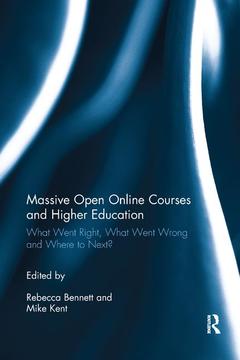Massive Open Online Courses and Higher Education What Went Right, What Went Wrong and Where to Next?
Coordonnateurs : Bennett Rebecca, Kent Mike

Since the first MOOC was launched at the University of Manitoba in 2008, this new form of the massification of higher education has been a rollercoaster ride for the university sector. The New York Times famously declared 2012 to be the year of the MOOC. However, by 2014, the number of academic leaders who believed the model was unsustainable doubled to more than 50%. While the MOOC hype has somewhat subsided, the attitudes and anxieties of this peak time can still be seen influencing universities and their administrations.
This is the first volume that addresses Massive Open Online Courses from a post-MOOC perspective. We move beyond the initial hype and revolutionary promises of the peak-MOOC period and take a sober look at what endures in an area that is still rapidly growing, albeit without the headlines. This book explores the future of the MOOC in higher education by examining what went right, what went wrong and where to next for the massification of higher education and online learning and teaching. The chapters in this collection address these questions from a wide variety of different backgrounds, methodologies and regional perspectives. They explore learner experiences, the move towards course for credit, innovative design, transformations and implications of the MOOC in turn.
This book is valuable reading for students and academics interested in education, eLearning, globalisation and information services.
1. What was all that about? Peak MOOC hype and post-MOOC legacies
Mike Kent and Rebecca Bennett
Part 1 – Barriers and opportunities
2. Any colour as long as it's black! MOOCs, (post)-Fordism and inequality
Rebecca Bennett and Mike Kent
3. Envisioning post-colonial MOOCs: Critiques and ways forward
Maha Ayham Bali and Shyam Sharma
4. Global footprints and localisation: The rise of MOOCs in China
Xin Wang
5. MOOCs for credit: Making the idea work
Jenny Ng and Leanne McRae
Part 2 – Teachers' and students' insights and experiences
6. Autoethnography: The story of 'doing a MOOC' or knowing 'the beast' from within
Melanie James
7. Exploring 'success' in MOOCs: Participants' perspective
Tharindu Rekha Liyanagunawardena, Partrick Parslow and Shirley Ann Williams
8. Learning from learners: How one MOOC's social media engagement created new insights
Sara Moseley and Hannah Scarbrough
9. Developing a MOOC: Factoring in disability
Louisa Smith, Karen Soldatic, Leanne Dowse and Mike Kent
Part 3 – Where to next?
10. Mentored open online communicites (MOOCs) as a third space for teaching and learning in higher education
Sue Ringler Pet, Katarina Silvestri, Stephanie Loomis, W. Ian O'Byrne and William Kist
11. Reframing MOOCs in higher education: Exploring professional development options
Vanessa P. Dennen and Jiyae Bong
12. The Selfie Course: More than a MOOC
Kath Albury, Tama Leaver, Alice Marwick, Jill Walker Rettberg and Theresa Senft
Rebecca Bennett is the Academic Support Programs Coordinator in the Kulbardi Aboriginal Centre at Murdoch University, Australia. She is a cross-disciplinary academic whose research and teaching interests include Cultural Studies and the Scholarship of Teaching and Learning. She has authored journal articles on critical tourism, digital pedagogy, academic identity, cross-cultural communication and queer/international student intersections.
Mike Kent is a senior lecturer and Head of Department of Internet Studies at Curtin University, Western Australia. Mike's research focus is on higher education, particularly online education, as well as online social networking platforms. His other area of interest is in people with disabilities and their use of, and access to, information technology and the internet.
Date de parution : 08-2019
15.6x23.4 cm
Disponible chez l'éditeur (délai d'approvisionnement : 14 jours).
Prix indicatif 50,12 €
Ajouter au panierDate de parution : 04-2017
15.6x23.4 cm
Thème de Massive Open Online Courses and Higher Education :
Mots-clés :
MOOC Participation; MOOC Education; Connectivist MOOCs; learning; MOOC Provider; Mike Kent; MOOC Platform; Maha Ayham Bali; MOOC Learning; Shyam Sharma; MOOC Design; Xin Wang; MOOC Experience; Jenny Ng; MOOC Student; Leanne McRae; MOOC Participant; Melanie James; MOOC Content; Tharindu Rekha Liyanagunawardena; MOOC; Patrick Parslow; MOOC Model; Shirley Ann Williams; Peer Assessment; Sara Moseley; MOOC Offering; Hannah Scarbrough; MOOC Development; Louisa Smith; MOOC Technology; Leanne Dowse; MOOC Subject; Karen Soldatic; Study MOOC; Sue Ringler Pet; MOOC Context; Katarina Silvestri; Graduate Level Education Courses; Stephanie Loomis; Peer Networks Learners; W; Ian O'Byrne; MOOC Discourse; William Kist; MOOC Completion; Vanessa P; Dennen; Community Journalism; Jiyae Bong; Kath Albury; Tama Leaver; Alice Marwick; Jill Walker Rettberg; Theresa Senft



